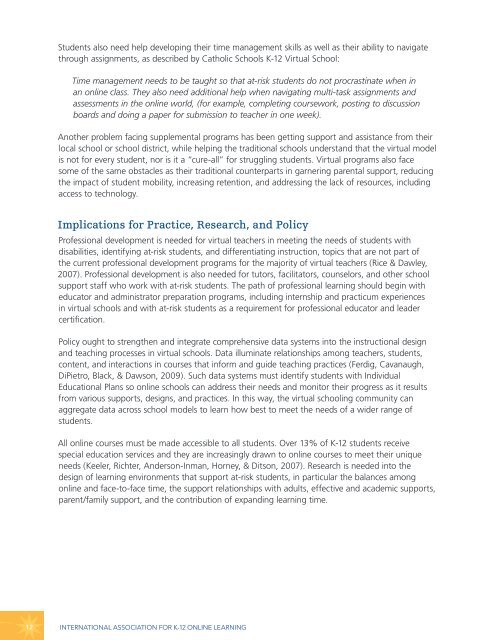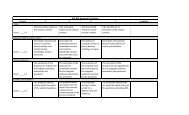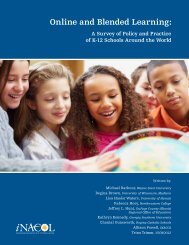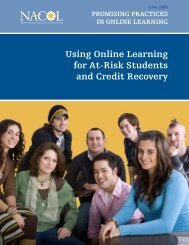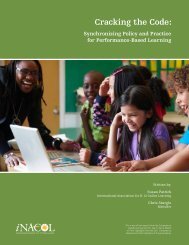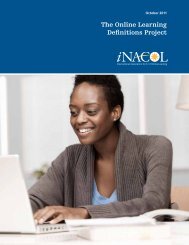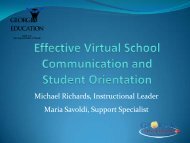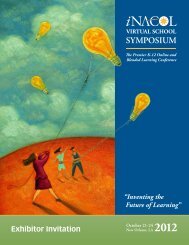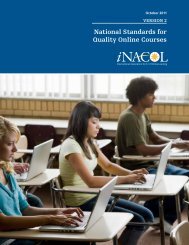An Exploration of At-Risk Learners and Online Education - iNACOL
An Exploration of At-Risk Learners and Online Education - iNACOL
An Exploration of At-Risk Learners and Online Education - iNACOL
Create successful ePaper yourself
Turn your PDF publications into a flip-book with our unique Google optimized e-Paper software.
Students also need help developing their time management skills as well as their ability to navigate<br />
through assignments, as described by Catholic Schools K-12 Virtual School:<br />
Time management needs to be taught so that at-risk students do not procrastinate when in<br />
an online class. They also need additional help when navigating multi-task assignments <strong>and</strong><br />
assessments in the online world, (for example, completing coursework, posting to discussion<br />
boards <strong>and</strong> doing a paper for submission to teacher in one week).<br />
<strong>An</strong>other problem facing supplemental programs has been getting support <strong>and</strong> assistance from their<br />
local school or school district, while helping the traditional schools underst<strong>and</strong> that the virtual model<br />
is not for every student, nor is it a “cure-all” for struggling students. Virtual programs also face<br />
some <strong>of</strong> the same obstacles as their traditional counterparts in garnering parental support, reducing<br />
the impact <strong>of</strong> student mobility, increasing retention, <strong>and</strong> addressing the lack <strong>of</strong> resources, including<br />
access to technology.<br />
Implications for Practice, Research, <strong>and</strong> Policy<br />
Pr<strong>of</strong>essional development is needed for virtual teachers in meeting the needs <strong>of</strong> students with<br />
disabilities, identifying at-risk students, <strong>and</strong> differentiating instruction, topics that are not part <strong>of</strong><br />
the current pr<strong>of</strong>essional development programs for the majority <strong>of</strong> virtual teachers (Rice & Dawley,<br />
2007). Pr<strong>of</strong>essional development is also needed for tutors, facilitators, counselors, <strong>and</strong> other school<br />
support staff who work with at-risk students. The path <strong>of</strong> pr<strong>of</strong>essional learning should begin with<br />
educator <strong>and</strong> administrator preparation programs, including internship <strong>and</strong> practicum experiences<br />
in virtual schools <strong>and</strong> with at-risk students as a requirement for pr<strong>of</strong>essional educator <strong>and</strong> leader<br />
certification.<br />
Policy ought to strengthen <strong>and</strong> integrate comprehensive data systems into the instructional design<br />
<strong>and</strong> teaching processes in virtual schools. Data illuminate relationships among teachers, students,<br />
content, <strong>and</strong> interactions in courses that inform <strong>and</strong> guide teaching practices (Ferdig, Cavanaugh,<br />
DiPietro, Black, & Dawson, 2009). Such data systems must identify students with Individual<br />
<strong>Education</strong>al Plans so online schools can address their needs <strong>and</strong> monitor their progress as it results<br />
from various supports, designs, <strong>and</strong> practices. In this way, the virtual schooling community can<br />
aggregate data across school models to learn how best to meet the needs <strong>of</strong> a wider range <strong>of</strong><br />
students.<br />
All online courses must be made accessible to all students. Over 13% <strong>of</strong> K-12 students receive<br />
special education services <strong>and</strong> they are increasingly drawn to online courses to meet their unique<br />
needs (Keeler, Richter, <strong>An</strong>derson-Inman, Horney, & Ditson, 2007). Research is needed into the<br />
design <strong>of</strong> learning environments that support at-risk students, in particular the balances among<br />
online <strong>and</strong> face-to-face time, the support relationships with adults, effective <strong>and</strong> academic supports,<br />
parent/family support, <strong>and</strong> the contribution <strong>of</strong> exp<strong>and</strong>ing learning time.<br />
12<br />
International Association for K-12 <strong>Online</strong> Learning


